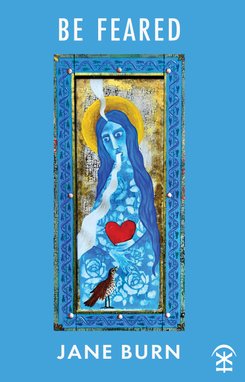REVIEW: JANE BURN’S ‘BE FEARED’
Reviewed by Stella Backhouse

This week, my grateful thanks are extended to the possibly slightly unlikely personage of glamorous TV presenter Melanie Sykes. Sykes’ recent revelation that she has been diagnosed with autistic spectrum condition (ASC) at the age of fifty-one sparked a slew of articles on the subject of late-diagnosis autism in women, and made writing a topical intro to Jane Burn’s new collection Be Feared a whole lot easier. That’s because Burn has herself received a diagnosis of ASC later in life, and has said that “neurodivergence is at the core of these poems which are both explorations in form and celebrations of my personal idiolect.”
Amongst the articles I read was one from The Guardian in which a group of women with late-diagnosed ASC told their stories. The congruence between their experiences and those catalogued by Burn is so close it’s eerie. Absorb the fact that many women believed their symptoms had for years been misinterpreted or ignored because doctors thought they “did not ‘look’ or ‘act’ autistic” – then turn to Burn remembering how “You might tell me I look completely normal, that there is nothing/wrong, that there are no usual signs”. Read of lives “scarred by victimisation, from bullying to rape, because without a diagnosis they did not know they were highly vulnerable to manipulation and abuse”- then find Burn’s description of being “fingered because she did not know why it was wrong”.
In the overall context of the collection, one of the most pertinent comments in The Guardian article came from the woman who said that pre-diagnosis she “had no identity – it was like looking in a looking glass with no reflection.” Mirrors are a central metaphor of Be Feared. However, rather than seeing nothing when she looks in the mirror, what Burn sees is a cripplingly distorted version of herself. In ‘How Autistic Spectrum Condition Made Her Worth Her Weight in Birds’, she describes how “She spurs at the wrong-ways /repeating of herself. No matter how she swims, there will be no split/from this clinging twin – the drag of her aping curse”.
The mirror metaphor is further developed by the embedding of references to the Hans Christian Andersen fairy tale The Snow Queen. According to Wikipedia, The Snow Queen opens with the devil making “a magic mirror that distorts the appearance of everything that it reflects. [It] fails to reflect the good and beautiful aspects of people and things, and magnifies their bad and ugly aspects”. In Burn’s hands, the mirror articulates the experience of being trapped in a society that tells her she doesn’t fit; that her personal qualities make her unacceptable.
Taken as a whole, Be Feared is a wide-ranging confessional that covers a number of aspects of Burn’s life including love of horses, motherhood, body image, the enduring legacy of the Methodist Christianity of her youth and the realisation that she is bi-sexual. It abounds with striking imagery, particularly around the freedom represented by birds and the natural world – the conjuring of the tenuous stability of a favourite foal with “knees like knots in string” is particularly sweet. But at its heart, this is a tale of rebirth.
‘Rebirth’ was a word used by another woman who spoke to The Guardian. That was what she said her diagnosis felt like. A number of poems in Be Feared describe Burn’s experience of alienation, low self-esteem, imprisonment inside her own head and tongue-tied inability to speak her truth. The process of rebirth is one of discovering and liberating the true self, which leads in turn to self-acceptance founded on solid internal knowledge, rather than on shadowy approximations of self reflected back from the outside world.
Ultimately, this is an encouraging, optimistic collection that offers comfort to anyone who has ever felt the frustration of not ‘fitting in’. If you can relate to “This bird has a secret, caught behind her lips. Look how her tongue/ toils like a trapped wing…Her kitchen is an aviary. She sees blue, its colour/served through cracks. Who made her mocking brain?”, Burn will give you hope that one day you will also relate to “I stole the mirror’s fear/when I broke upon its bevelled edge/blinked away her caustic green/opened my own shade of sky”.
Jane’s collection Be Feared is available to purchase online from Nine Arches Press. Stella also previously reviewed another Jane Burn collection: One of These Dead Places.
